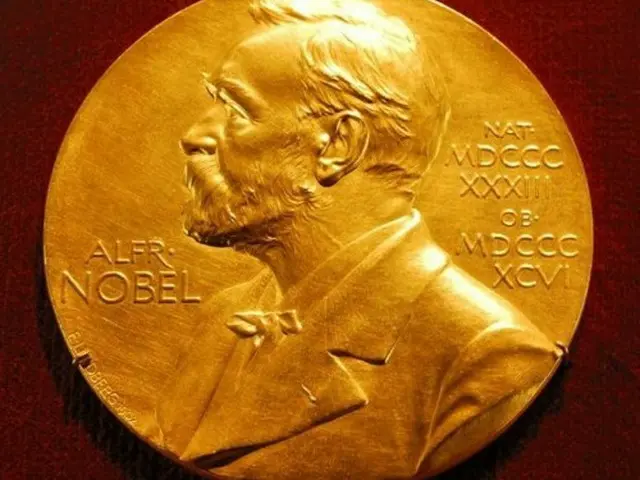This is the second time that a Nobel Prize has been awarded overall, since then-President Kim Dae-jung won the Peace Prize in 2000. South Korea is filled with joy at Han's award. Local media
The Hankyoreh reported the story in unison, saying, "The news of Han Kang's winning the literature prize was a great achievement that brought cheer to book-loving citizens."
Han was born in the southwestern city of Gwangju and attended Yonsei University in the capital, Seoul.
After graduating from the Japanese Literature Department at the University of Tokyo, he made his literary debut in 1993 with five poems. The following year, his short story "Red Anchor" was published in a newspaper, and he began his career as a novelist.
For his short story collection "The Vegetarian," he became the first Asian author to win the International Booker Prize, one of the world's three major literary awards along with the Nobel Prize in Literature. He has become a writer who has attracted attention from around the world.
Regarding Han's work, he said, "He is highly regarded for creating an original world of work that weaves universal human issues such as death and violence in a poetic and lyrical style."
The Swedish Academy, which selected Han as this year's Nobel Prize winner, said in explaining the reasons for the selection that Han's work is
"Her powerful, poetic prose confronts historical trauma and reveals human fragility. In all her work she expresses a unique awareness of the relationship between mind and body, life and death.
"Her poetic and experimental style is therefore an innovative presence in contemporary prose literature," he said. With the exception of the Peace Prize, South Korea has never produced a Nobel Prize winner.
The Korean people are overjoyed at the news that Han won the literary award, as he had not received the award before. The Korean newspaper Hankyoreh reported the voices of the people on the streets, and according to an article, a 35-year-old woman who was interviewed by the newspaper said, "I can't read a foreign language.
"I am deeply moved that I was able to win the Nobel Prize in Literature, despite having overcome the barriers of language," he said. In South Korea, the rapid economic growth of the 1970s is called the "Miracle of the Han River."
"This is the miracle of Hangang," he said, in a play on Han's name, which is pronounced the same way. Meanwhile, according to South Korean media, Han said in an interview with the selection committee after receiving the award, "I'm just a kid.
"I found out about the award at around 8 p.m. after finishing dinner with my son. I was very surprised and very honored," he said. President Yun Seok-yeol sent a letter to the National Diet on behalf of Han.
He praised the work as "a great achievement in the history of Korean literature and a national cause for joy for the entire nation," and expressed his hope that "it will continue to be a wonderful work that is loved by readers around the world."
Korean celebrities also congratulated Han. V, a member of the popular group "BTS," wrote on his SNS, "I watched (Han's work) 'The Boys Are Coming' in the military.
Congratulations," he wrote. Singer HYNN was impressed by the line in Han's novel "All the White Things," "Even if I get dirty, I want to give only the white things."
Hynn said through its management office, "I was really happy to hear the news today that Han Kang won the Nobel Prize in Literature.
It is truly wonderful that Han Jiang has been able to move the whole world with his unique perspective and insight in this national production."
According to Yonhap News, following Han's award, large bookstores in South Korea are stocking his works.
Orders for the book are flooding in. Online bookstores are also experiencing confusion, with their websites temporarily unable to connect due to the continued influx of orders. According to Yonhap, a representative from Kyobo Bookstore, a major bookstore, said in an interview,
"We didn't expect Jiang's Nobel Prize, so we don't have any books in stock," he said. Currently, most of Han's works are available for pre-order at Kyobo Bookstore, but on November 11, one day after the award was announced, the books were sold out.
On the 1st, 60,000 copies were sold in half a day. Meanwhile, Han's works have been translated and published in Japan. According to the Sankei Shimbun, a special booth was set up at Kinokuniya Bookstore Shinjuku in Shinjuku Ward, Tokyo.
The book, which includes "No Goodbye" and "The Vegetarian," is on display at the store, and customers are said to be picking up copies. The Korean newspaper Chosun Ilbo published an editorial on the 11th stating, "Han Kang's Nobel Prize in Literature is a great achievement."
"Winning the award is not only a personal honor for Han Kang, but also a national achievement, as the high level of Korean literature has been recognized through the world's most prestigious literary award."
"The Nobel Prize in Literature awarded to Jeong-soo will not only bring glory to an individual, but will also serve as an opportunity to raise Korea's international standing as a cultural powerhouse," he said. "I hope that readers around the world who are interested in reading Korean literature will also take notice."
"It is clear that this will attract the attention of many readers, expand the market for Korean literature to an unprecedented extent, and contribute greatly to the internationalization of Korean literature."
The awards ceremony will be held in Stockholm on December 10th.
2024/10/15 14:08 KST
Copyrights(C)wowkorea.jp 5

